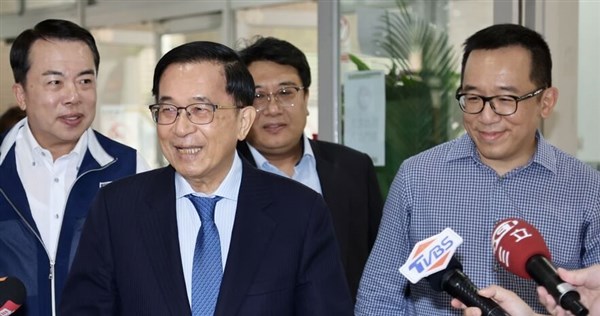Taipei, April 20 (CNA) Former President Chen Shui-bian (陳水扁) on Saturday spoke of the importance of dialogue and respect for opposing views in a rare public address touching on political topics that comes at a time of fierce partisan wrangling in Taiwan.
In a speech on Taiwan’s democracy to the Ketagalan Institute, an organization he founded in 2003 to train rising political professionals, Chen praised democracy as the only political system that gives power to the people, maintains separation of powers, tolerates diversity and puts no one above criticism.
In a democratic system, no one person calls the shots, and no one should be labeled as a “fellow traveler of this or that” ideology because they hold differing views, Chen said.
Chen was asked by reporters how he would go about easing Taiwan’s political divisions, given its divided government and the recent call by Taipei’s mayor for a no-confidence vote against the Cabinet.
Chen said he could not comment directly on the current situation, but noted that when he took office in 2000, his Democratic Progressive Party (DPP) also held limited power and faced strong opposition from other parts of the government.
In that environment, and due to Taiwan’s ongoing democratic transition, he said, he did not remove his critics in government, including top military commanders, but tried to treat them with tolerance and respect.
“The best way to deal with opposition forces is not by getting rid of them,” Chen said, adding that after his inauguration as president, he hosted a summit with his electoral opponents — independent James Soong (宋楚瑜) and Lien Chan (連戰) of the Kuomintang (KMT).
“People with power or official positions need to be the first to make concessions, to facilitate dialogue,” he said.
Chen’s remarks were taken by some in the public as an indirect commentary or even criticism of Taiwan’s DPP-led government, which has been at loggerheads with the opposition-controlled Legislature.
He later told reporters, however, that despite having faced four separate recall motions himself, as a DPP member, he would “support to the end” the party’s efforts to pass mass recalls of KMT lawmakers.
Chen, who was elected as Taiwan’s first president from the DPP in 2000, was detained by prosecutors shortly after his second term ended in 2008, and was later sentenced to 20 years in prison in a series of corruption cases.
He was released from prison on medical parole in 2015.
